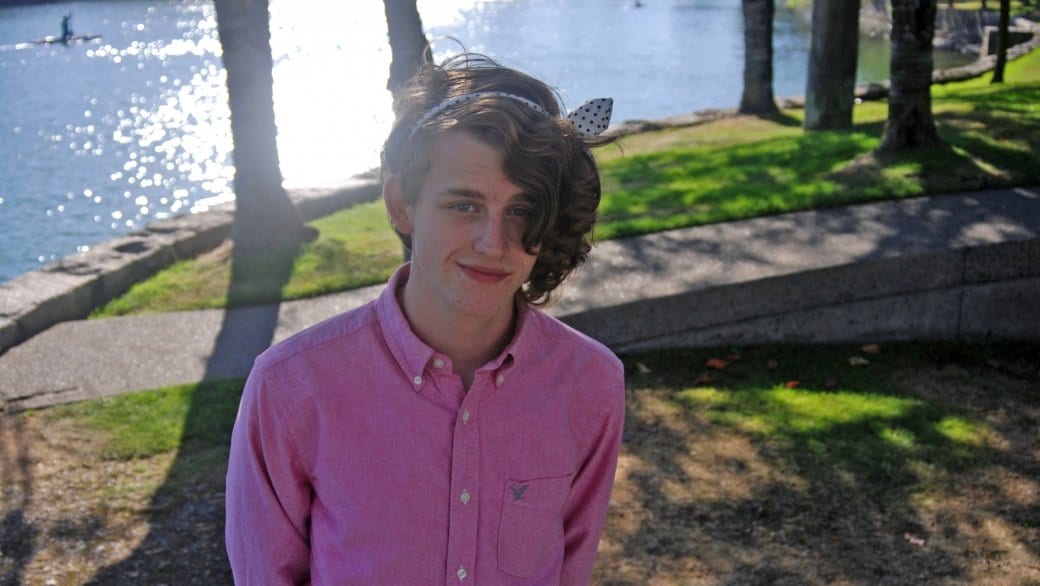Three teenagers. The Canadian suburbs. A chance meeting in the woods. A strong feeling of queer community. It might not be the usual story, but it’s the one Isaac McAndless-Davis wants to tell.
Written for the Eternal Theatre Collective’s show Square One, which ran in August on Granville Island, the 17-year-old’s play Person in the Woods features three queer teenagers who rely on their relationships with each other to understand their own identities and overcome adversity.
“I would say my main objective was to portray queer experiences and queer culture,”
McAndless-Davis, who uses the gender-neutral pronoun ce, says. “Something that I’ve found quite profound in queer communities is that we all have to be role models for each other.”
Finding a community was easy for McAndless-Davis, whose predominantly queer friend group naturally drifted together in school. In addition to a high school GSA, ce makes a point of going to drop-ins at Qmunity, queer proms and pride parades, and enjoys a strong support system at home.
Being surrounded by other queer people was a huge benefit. For years, McAndless-Davis felt uncomfortable in cir own body, but pushed the feelings aside, only having heard of binary trans people who were either men or women. McAndless-Davis felt like neither.
“It wasn’t until some of my friends began coming out as non-binary that I learnt what that was and started to identify with their experiences. So them coming out and them being a part of trans and non-binary communities led to me having more friends and connections there and it just all rolled together and made me realize that my experience matched theirs.”
For McAndless-Davis’ characters, though, coming out and being accepted by families and friends weighs heavily. Harry (Daisy Hulme) meets W (Valen Oliver) one night in the woods, and the two quickly bond over feelings of invalidation and frustration. Harry’s parents refuse to acknowledge she’s queer, while W’s family refuses to accept W’s non-binary gender identity. Struggling by himself, Kole (Jimmy Kwan) stays in a sexually abusive relationship because he’s too afraid to out himself. The struggles faced by the characters are based on the real-life experiences of queer youth McAndless-Davis interviewed while writing.
“I wanted to make sure I was being honest in how I was portraying these experiences,” McAndless-Davis says. “I wanted to make sure that nothing was shown that couldn’t actually happen, because I know it has.”

Despite the stories of hurt and rejection, McAndless-Davis wants what happens on stage to be positive: “The show is tragic, but all the tragic elements are things that were described or talked about in dialogue or narration, whereas anything that happened on stage was how people were learning to deal with it, and actually getting through it, and creating safe spaces, and finding pride and learning to combat shame.”
As well as celebrating queer communities, McAndless-Davis hopes Person in the Woods will give the audience a chance to consider how they might be contributing to oppression.
“There’s nobody on stage who ever perpetuates these issues, you only ever see how they’re able to get away from it and survive it. The actual antagonist and the blame are really ambiguous. My hope is that people are able to reflect on how they might be the one allowing these terrible things to happen,” McAndless-Davis says.
Even with support, McAndless-Davis still experiences discrimination.
“When I do wear a dress or something more feminine in public and I get read as trans I have experienced a lot of backlash just for existing. I’ve had teachers pry; I’ve had classmates be in shock or just laugh at me. I’ve had somebody drive by me just flipping me off,” ce says. “There is always resistance, and always resistance around correcting people who misgender me. Just trying to exist and be treated the same way as a cis person is a constant difficulty.”
McAndless-Davis hopes the play can encourage queers to seek out a community:
“There are ways to live authentically and freely, and that can be found by finding people like you, and that that’s an important thing to do.”

 Why you can trust Xtra
Why you can trust Xtra


